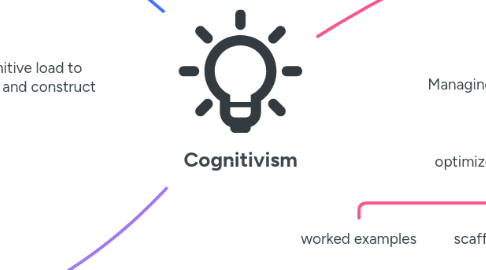
1. Foundational Figures
1.1. Piaget
1.1.1. learners are active agents in the construction of knowledge, which needs to be modified to fit existing schema
1.2. Bandura
1.2.1. individual and social influence on cognitive processes
1.3. Bruner
1.3.1. applied cognitivist theories to the practice of education, introducing spiralling and scaffolding
1.4. Sweller
1.4.1. reduction of cognitive load to optimize learning and construct schemas
2. Key Concepts
2.1. Information Processing
2.1.1. Brain ↔ Computer
2.2. Memory
2.2.1. STM
2.2.1.1. 30 seconds
2.2.1.2. two-way flow with LTM
2.2.1.2.1. rehearsal and processing to transfer to LTM
2.2.1.2.2. retrieval from storage
2.2.2. LTM
2.2.2.1. permanent storage and organization of knowledge
2.3. Cognitive Load
2.3.1. Lessened or managed by:
2.3.1.1. chunking
2.3.1.2. activating prior knowledge
2.3.1.3. purposeful presentation
2.3.1.4. matching existing schemas
2.3.2. amount of information the working memory is processing at a given time
2.3.3. overload if there is too much information to process simultaneously
2.4. Schema
2.4.1. *how* information is stored
2.4.1.1. networks
2.4.2. information must be integrated into existing schemas
3. Applications in Education
3.1. Planning Learning Experiences
3.1.1. design tasks to support cognitive processes by using Bloom's Taxonomy
3.1.1.1. lower-order thinking skills
3.1.1.1.1. recall
3.1.1.1.2. understanding
3.1.1.1.3. application
3.1.1.2. higher-order thinking skills
3.1.1.2.1. analysis
3.1.1.2.2. evaluation
3.1.1.2.3. creation
3.2. Managing the Cognitive Load
3.2.1. optimize the cognitive load
3.2.1.1. worked examples
3.2.1.2. scaffolding
3.2.1.3. chunking
3.2.1.4. collaboration
3.3. Working with Schemas
3.3.1. new learning needs to be integrated with connections to prior knowledge
3.3.1.1. concept maps and graphic organizers
3.3.1.2. compare and contrast
3.3.1.3. activating prior knowledge
3.4. Metacognition
3.4.1. "thinking about thinking" allows students to be aware of and maximize thought processes
3.4.1.1. thinking routines
3.4.1.2. reflections
